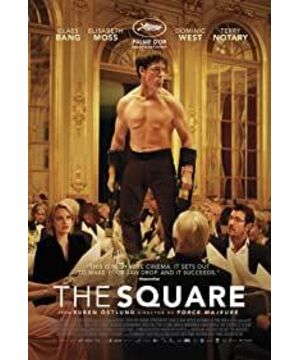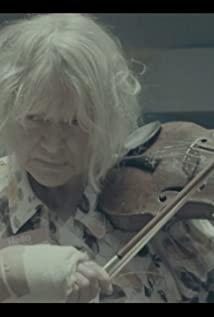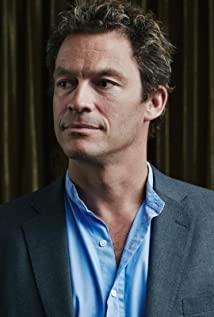Without the idea of equality, and unequal "square" cannot be built.
The film The Square (2017) promotes the idea of equality, so it explains what the "square" is several times: within the square is a sanctuary of love and trust, and within its boundaries, we share equal rights and obligations. Obviously, "square" is to build an equal world, but it is the idea of equality, that is, those true ideas, thoughts, and behaviors of equality that are deeply rooted in people's hearts, that are the preconditions for building this equal world. Try to read as follows:
Without equality, where can "love" and "trust" come from? The film seems to tell us from the beginning that there is no love and trust between people at all. The station exit was crowded with people, and there was a man in need of help lying in an open space. Even if a lady was asking for help from a man, no one wanted to "love" him. As soon as the male protagonist, Christian, appeared, it made people feel that he was a decent middle-class person, so he was targeted by thieves in the station square, and the thief gang used a little trick to steal his mobile phone and wallet. After he reacted, he immediately sought help from passers-by, but no one expressed trust and love for him. It can be seen from this that the film wants to tell us from the beginning that we live in a world without love and trust. This is in stark contrast to the "square" art exhibition that the male protagonist is curating. So, is the square of equality a utopia, impossible to achieve? The film does not seem to be so pessimistic. On the contrary, it tries its best to tell us that the possibility of "square" lies in the idea of equality between people.
Equality requires non-discriminatory treatment. The next part of the film seems to be telling us that "non-discrimination" is crucial. "Differential treatment" is "discrimination", it is "inequality"; it will make anyone who has a sense of dignity infuriated. The male protagonist is the curator of the art museum, and everyone listened to his speech with great interest. However, when he asked the chef to introduce the menu, everyone retreated, and he didn't take the chef seriously at all, although out of basic courtesy, you should also listen to the chef. After all, these people are serving you. However, people are such snobbish animals. The curator is the curator, and the chef is the chef, and they will not treat them equally. As a result, even the little head chef was provoked by the wrath of the thunder. Although it only took a few seconds, it was also a strong protest against "differential treatment".
Equality requires treating others as they are. "Treating others as oneself" is almost religious, and it is difficult for those who are not truly devout to do so, but the practice of equality requires the spirit of treating others as oneself. Therefore, the film shows a conversation between the male protagonist and a female beggar in a convenience store. The male protagonist seems to want to practice the concept of "square" and feels that he should have "love" for the disadvantaged, poor people, and beggars. As soon as he entered the convenience store, he took the initiative to greet the female beggar. As a result, the female beggar was quite arrogant. Let the male protagonist buy food and attach conditions to the food. Although it is a bit funny, the intention is obvious: to see if the male protagonist has the skills. Equality. It turned out that the male protagonist bought the chicken crispy noodle roll, threw it on the table very rudely, and asked the female beggar to remove the onions by herself, and the female beggar was angry. The behavior of female beggars may be excessive in everyone's eyes, but this is because we do not have that kind of equality. As far as female beggars are concerned, she wants a piece of food, but she doesn't want to lose their dignity. What can keep her dignity is, of course, that she feels that this food is not being given away, but to achieve this can only be achieved by her "excessive demands," because if he has an equal heart, he must treat her like himself; if he doesn't eat onions, he will cull them for her.
Equality requires tolerance. Tolerance is called tolerance for the intolerable; it is the subject of tolerance who is treated unfairly. Although it is said here that "equality requires tolerance," in fact, "equality" and "tolerance" are mutually conditional. The art interview shown in the film speaks volumes. When everyone was listening quietly to the artist's interview, a patient with Tourette's Syndrome kept swearing, which not only interrupted the conversation of the guests but also affected the audience at the scene. This is intolerable. If one of the audience members hadn't explained that "The Tourette" was also being mentally tortured because it was uncontrollable, everyone might have kicked the Tourette out of the arena soon. Therefore, in the head of the equal, as the guest said, there is no reason why we should not allow the foul-language speaker to listen here; if he does not voluntarily leave by himself, his right to listen as an equal will not be deprived. Equals should have tolerance for others.
Equality requires the abandonment of "potential". Where there is a gap, there will be "potential", and where there is power, there will be no equality. The film seems to deliberately create a variety of "potentials." The male protagonist asked his subordinates to help him deliver the letter after being rejected, and said, "As your boss, can I still trust you in the future?" He didn't want to go upstairs to deliver the letter. The reason was that he was afraid of being recognized. A condescending attitude, obviously because of the "potential" in his heart. When people are proud, they will naturally show "potential". When the male protagonist took back his mobile phone and wallet, the complacent gesture was ugly. He originally refused the request of the beggar in the convenience store for money, but when he found that the mobile phone and wallet were intact, he "rewarded" all the money in the wallet to the beggar. This "reward" was made by a moment of pride. The result of the "potential" is that he didn't want to help the beggar. The one-night stand girlfriend thinks that she has sex with him based on her interest in the male lead, but the male lead self-righteously says that this is the result of his attraction to power and status. He thinks too much of his "potential". A woman who can keep a gorilla as a pet probably doesn't care too much about the outer things of a man. When facing the beggars in the shopping mall, he lacked sympathy as always and refused to give alms, but when he wanted to find his lost daughter and was rejected for help, he turned to the beggars to help take care of the items. It seems that vulnerable people like beggars should be helping him. Because the male protagonist's sense of "potential" is too strong, he will not treat the little boy that his letter hurts.
Equality requires responsibility. The film always seems to imply that the male protagonist Christian is not a good practitioner of the "square" concept because, in addition to his "potential", he is also a person who lacks a sense of responsibility. For example, if the artwork is destroyed, he just wants to dispose of it casually. He sleeps with people and doesn't want to leave any "remains" because he is afraid of taking responsibility. If there is no basic sense of responsibility between people, there will be no love and trust at all, and "square" will always be a utopia. People become people because we can form a society, and the first premise of forming a society is because we need "care" and "trust". If each of us were "isolated islands", then we would be like those gravel art that appeared in the exhibition hall at the beginning of the film, and we would be like the saying on the wall at the same time, we would have nothing. Caring for each other is the responsibility of our society. The reason why the person who performed the gorilla at the dinner party was able to act recklessly was that at the banquet, except for the obvious individual who resisted the beast for the sake of their relatives, everyone else bowed their heads and didn't want to cause trouble. They all want to stay out of the way, so this "gorilla" can be in the "human" world as if it were still in the jungle. Fortunately, the "gorilla" acted in the rape scene, which aroused a little "humanity" in everyone. Otherwise, those well-dressed banqueters would not be "humans". The banquet place is just a "square" with an enlarged point. By performing the gorilla scene, the film wants to tell us that we can build a "square" world by taking the maintenance of everyone's equal rights as our responsibility.
Equal "squares" are still possible. Although I had a hasty conclusion after watching the film: there is no "square" between people. But by defending his rights against the little boy in the film, and desperately trying to get the male protagonist to admit his mistakes and apologize, I think that with such a next generation, it is possible to build a "square", a person who knows how to protect his rights, only Know how to uphold the rights of others. Of course, from the scene where the male protagonist finally realizes the importance of taking responsibility and the scene where his two daughters finally try to find the little boy with him to apologize, there is still hope for the "square" world in the future. The last scene of the film seems to be trying to express this.
View more about The Square reviews










